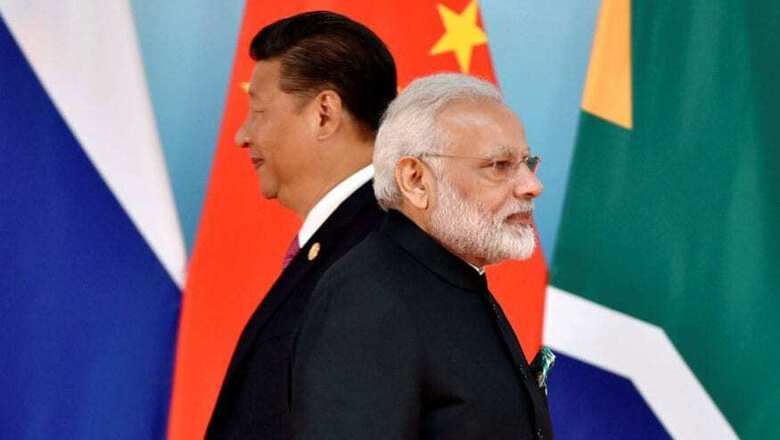
views
New Delhi: It was in 2014 that Chinese President Xi Jinping paid a visit to newly elected Prime Minister Narendra Modi’s bastion of Gujarat. Cut to 2018, Modi is all set to meet the Chinese supremo in Wuhan for an informal meet.
The current meeting comes under a different political setting too. The meeting between a more powerful Xi, the undisputed leader of China with an indefinite reign of power, and Modi, who is seeking re-election next year, will be a huge step for both in terms of reaffirming their foreign policy.
The world is watching closely as the leaders meet, with the informal setting being considered as the biggest step for resetting ties.
This, however, hasn’t come easy. Relations between the two countries hit a low point last year as the two neighbours were engaged in a military standoff along the Arunachal border. There have been visits by Indian authorities to China, including those of foreign secretary Vijay Gokhale and external affairs minister Sushma Swaraj.
During Swaraj’s visit, it was announced that both countries were renewing the Kailash Mansarovar Yatra through Nathu La route and that China had agreed to share hydrological data regarding Brahmaputra.
While two pertinent issues seem to have been resolved via strong talks, Modi’s informal meet will hopefully set the future discourse for other topics that the Asian giants have differed on.
India-China border
Troops of India and China were locked in a 73-day-long standoff in Doklam since June 16 after the Indian side stopped the building of a road in the disputed area by the Chinese Army. Bhutan and China have a dispute over Doklam. The MEA on August 28 had announced that both sides were disengaging from the face-off site. The area of the standoff is also claimed by Bhutan.
“The boundary incident that happened (at Doklam) last year someway reflected lack of mutual trust between the two countries,” Vice Foreign Minister Kong Xuanyou recently told the the media when asked about the Doklam standoff.
And indeed, the border standoff has been an issue in bilateral ties. There have also been reports of transgressions across the border by the Chinese troops.
India’s entry into Nuclear Supplier’s Group
In the past two years, China has also blocked India's entry into the Nuclear Suppliers Group. While most other countries seemed to have come around at the plenary in Seoul, Beijing stuck to its stand that India must sign the Nuclear Non-Proliferation Treaty (NPT) first. It also kept pushing for its ‘all-weather friend’ Pakistan to be considered at par with India.
Renewed support for Masood Azhar, Pakistan
China last year blocked a resolution at the United Nations to declare Pakistan-based Jaish-e-Mohammad chief Masood Azhar a global terrorist.
This is not the first time China has done this and has previously halted attempts by both India, US to declare Azhar an international terrorist. Interestingly, China happens to be the only country in the UN Security Council to be actively supporting Azhar; all other countries are on board the ‘global terrorist’ tag for the JeM chief.
It is a cause of concern for India as JeM chief is accused of several attacks, including the one on the Indian Parliament in 2001.
China has also defended its all-weather ally Pakistan time and again, completely quashing India’s stand on Pakistan harbouring terror. Chinese minister of foreign affairs Wang Yi recently said that the relations between the two countries had enjoyed a good momentum and that the “two sides have maintained close contacts in all directions and coordinated with each other on major international and regional issues.”
BRI & Kashmir as priority
Yet again, a decision bound to raise some concerns. At the Communist Party Congress last year, Yao Wen, Counsellor of the Department of Asian Affairs under China’s MFA, said that China was willing to consider India’s concerns with the ‘One Belt One Road’ initiative and that Kashmir remained a top priority for China, along with the Korean Peninsula, the South China Sea dispute and instability in Afghanistan.
India has been against China’s initiative since the very beginning, calling out China as “the project threatened India’s sovereignty”. China’s pact with Pakistan, known as the China Pakistan Economic Corridor, runs via Pakistan-occupied
A tiny village as entry to Arunachal Pradesh?
Chinese President Xi Jinping, last year, reportedly told herdsmen from a Tibetan settlement bordering Arunachal Pradesh to "set down roots" there and safeguard "Chinese territory".
Replying to a letter, by two girls from a family who introduced their township in Tibet’s Lhunze county, Xi told them to develop settlements and stay put in the area bordering India.
Situated in southwest China's Tibet, Lhunzhe is close to India's Arunachal Pradesh, which Beijing claims as its own and calls South Tibet.
Xi had also said while China was ready to settle its border dispute with neighbours, it cannot be expected to swallow everything which undermines its integrity and sovereignty.

















Comments
0 comment